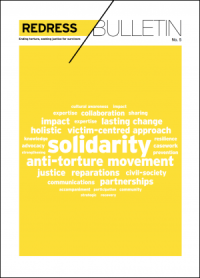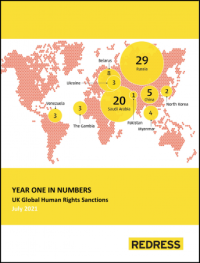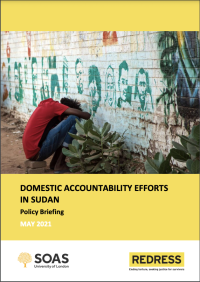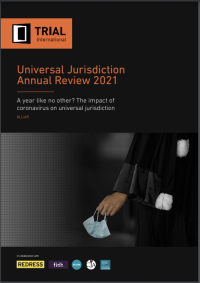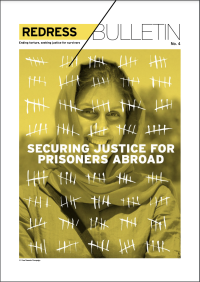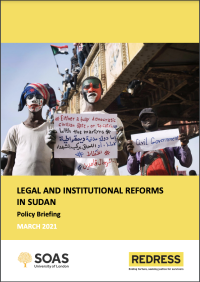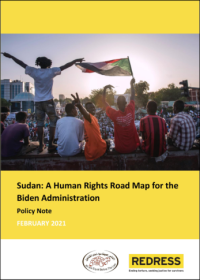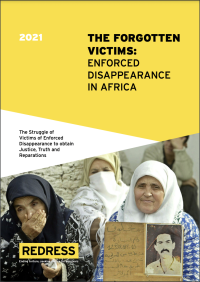
Enforced disappearance has been used as a tool of oppression all over the world in the context of internal armed conflicts; its use in Africa can be traced back to colonial times, when many colonial governments disappeared freedom fighters. Today, many African States use enforced disappearance in a range of contexts against different groups of people, from human rights
defenders to ethnic minorities, migrants and opposition leaders.
This report considers the practice of enforced disappearance in Africa, exploring the contexts in which it takes place, the existing international and regional legal and policy frameworks in place to prevent and respond to enforced disappearances, and the gaps in those frameworks that prevent the eradication of enforced disappearance in Africa, as well as making a set of recommendations to the relevant bodies on how to eliminate the practice on the continent.
REDRESS would like to express its gratitude to the law firm Linklaters for providing invaluable pro bono support on research, drafting and editing of the report. We further thank our partners, Lawyers for Justice in Libya, Zimbabwe Lawyers for Human Rights, the African Center for Justice and Peace Studies, and the MENA Rights Group, for their important input in exploring the scope of enforced disappearances in Libya, Zimbabwe, Sudan, and Algeria.
In this Bulletin, we draw attention to a number of successes that have been seen in the realm of accountability for perpetrators of torture, such as the significant amendments made to the original bill form of the Overseas Operations Act in the UK and the International Accountability Platform for Belarus launched in Belarus. Also highlighted are some important wins in the area of torture and women's rights, and we outline a number of projects we will be carrying out under our Solidarity programme, including a set of Practice Notes and other training materials on Holistic Strategic Litigation Against Torture. The Bulletin also provides the latest updates on our advocacy campaigns, publications, and policy work in recent months.
Launched one year ago on 6 July 2020, the UK’s Global Human Rights Sanctions regime gave the UK Foreign Secretary the ability to sanction persons implicated in human rights abuses anywhere across the globe. The first anniversary of the UK Global Human Rights Sanctions regime provides an opportunity to examine how the UK government has used its new tool for tackling human rights abuses, as detailed in this paper. A data-driven analysis shows 78 designations arising from 11 situations of human rights violations. There was a notable skew towards designations for violations of the right to life and prohibition on torture, with fewer designations for forced labour. Six entities were sanctioned, including military holding companies and public security bureaus. Individuals designated ranged from politicians and military officials to family members of perpetrators and prison doctors.
Sudan’s transitional government has taken some important steps towards securing justice for past human rights violations and international crimes in Sudan, but more is needed. As this policy briefing discusses, this includes additional progress on the planned justice institutions under the Juba Peace Agreement and Constitutional Charter 2019, and the elimination of remaining legal and institutional obstacles to accountability. To date, the perpetrators of serious human rights violations and international crimes in Sudan have, by and large, not been held accountable, even as human rights violations continue throughout Sudan.
The 2021 Universal Jurisdiction Annual Review (UJAR) highlights the impact of COVID-19 on prosecutions of torture, war crimes and other universal jurisdiction crimes across the world. It was researched and produced by TRIAL International with the contribution of REDRESS, the European Center for Constitutional and Human Rights, the International Federation for Human Rights, the Center for Justice and Accountability and Civitas Maxima. It benefited from the generous support of the Taiwan Foundation for Democracy, the Oak Foundation, the Foreign, Commonwealth & Development Office of the United Kingdom and the City of Geneva.
In this Bulletin, we draw attention to the plight of British citizens detained abroad, such as Nazanin Zaghari-Ratcliffe and Jagtar Singh Johal. We also present our new five programmes - Justice, Reparation, Dissent, Discrimination and Solidarity - areas that align with our historical achievements and build on REDRESS’s established strengths. The Bulletin also provides the latest updates on our advocacy campaigns, publications and policy work during September 2020-February 2021, including an emerging area of work in which we have been engaging to respond to the connection between grand corruption and human rights abuses by taking action to seize the corrupt asset of high-profile human rights abusers and, where possible, have them assigned as reparations for the benefit of their victims.
The Juba Peace Agreement and the 2019 Constitutional Document commit Sudan’s transitional government to making a series of critical human rights reforms. A set of legislative amendments in November 2019 and July 2020 addressed key issues in Sudan, including female genital mutilation, cooperation with the International Criminal Court, and torture. While these reforms were widely welcomed outside of Sudan as a sign of the government’s commitment to addressing legislative shortcomings as part of Sudan’s political transition, more is needed.
This policy briefing suggests several priority areas for reform, including the review of security and judicial sector policies and practices, the criminalisation of torture and enforced disappearances in Sudan’s criminal code in conformity with UNCAT, and human rights training for government actors in key sectors, among others. These steps should be taken in collaboration with the whole spectrum of stakeholders including civil society, victims, communities, and marginalised groups in Sudan.
The new US president, Joe Biden, has signaled his commitment to resetting the US relationship with countries in Africa, including through a focus on fighting corruption and advancing human rights on the national and regional level. As part of this commitment to promoting democracy and enhancing protections for historically marginalised groups, the Biden administration should double down on a human rights-centred policy in Sudan. There is real momentum in Sudan for important reforms, but strong voices for change must contend with a deepening economic crisis and political headwinds. Recognising these challenges, the US should take concrete action to reinforce recent steps towards democratization and human rights reforms. This Briefing Note by REDRESS and PLACE lays out several human rights priorities for the United States in Sudan under the new administration.


